HBS108 Evidence Based Practice: Evidence Sourcing and Evaluation
VerifiedAdded on 2023/06/14
|9
|1933
|287
Homework Assignment
AI Summary
This assignment solution addresses key concepts in evidence-based practice, including the deconstruction of citations, descriptions of inductive and deductive research methods, and the identification of qualitative research characteristics. It develops a relevant research question and hypothesis, details database search strategies, and provides a Deakin-Harvard citation. The solution also defines systematic reviews and their importance in healthcare, along with an example located via NCBI. The assignment concludes with recommendations based on the systematic review findings. Desklib offers a wide range of study resources, including past papers and solved assignments, to support students in their academic endeavors.
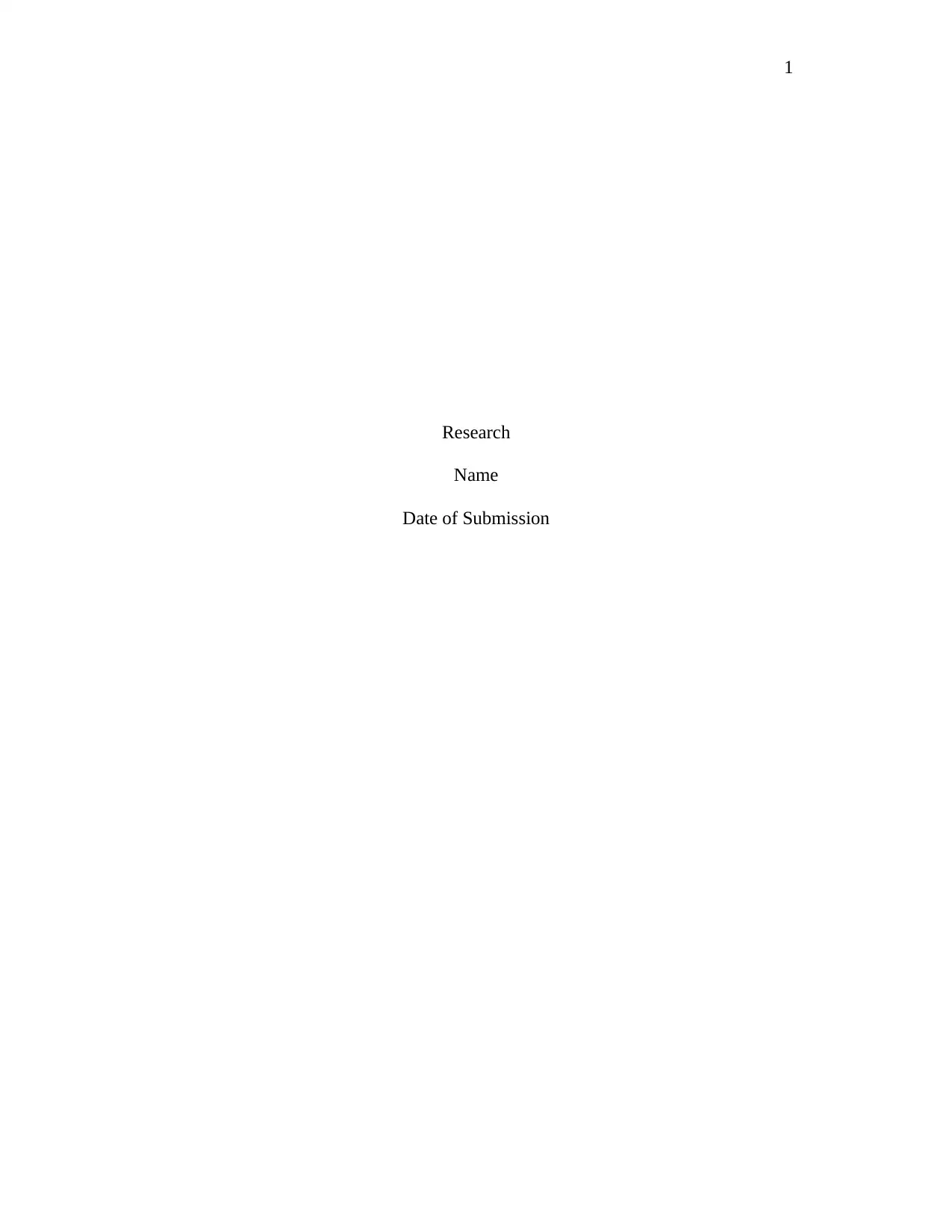
1
Research
Name
Date of Submission
Research
Name
Date of Submission
Paraphrase This Document
Need a fresh take? Get an instant paraphrase of this document with our AI Paraphraser
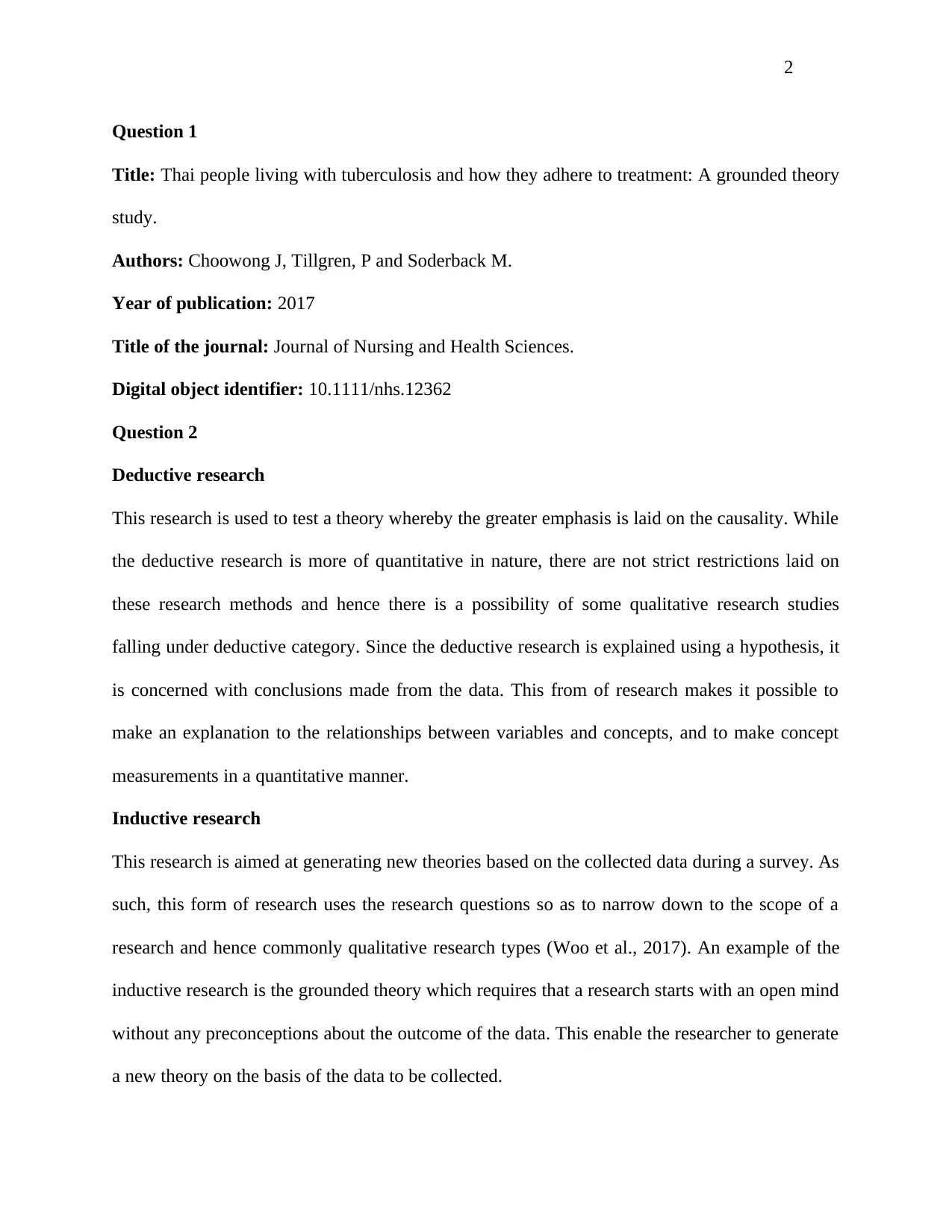
2
Question 1
Title: Thai people living with tuberculosis and how they adhere to treatment: A grounded theory
study.
Authors: Choowong J, Tillgren, P and Soderback M.
Year of publication: 2017
Title of the journal: Journal of Nursing and Health Sciences.
Digital object identifier: 10.1111/nhs.12362
Question 2
Deductive research
This research is used to test a theory whereby the greater emphasis is laid on the causality. While
the deductive research is more of quantitative in nature, there are not strict restrictions laid on
these research methods and hence there is a possibility of some qualitative research studies
falling under deductive category. Since the deductive research is explained using a hypothesis, it
is concerned with conclusions made from the data. This from of research makes it possible to
make an explanation to the relationships between variables and concepts, and to make concept
measurements in a quantitative manner.
Inductive research
This research is aimed at generating new theories based on the collected data during a survey. As
such, this form of research uses the research questions so as to narrow down to the scope of a
research and hence commonly qualitative research types (Woo et al., 2017). An example of the
inductive research is the grounded theory which requires that a research starts with an open mind
without any preconceptions about the outcome of the data. This enable the researcher to generate
a new theory on the basis of the data to be collected.
Question 1
Title: Thai people living with tuberculosis and how they adhere to treatment: A grounded theory
study.
Authors: Choowong J, Tillgren, P and Soderback M.
Year of publication: 2017
Title of the journal: Journal of Nursing and Health Sciences.
Digital object identifier: 10.1111/nhs.12362
Question 2
Deductive research
This research is used to test a theory whereby the greater emphasis is laid on the causality. While
the deductive research is more of quantitative in nature, there are not strict restrictions laid on
these research methods and hence there is a possibility of some qualitative research studies
falling under deductive category. Since the deductive research is explained using a hypothesis, it
is concerned with conclusions made from the data. This from of research makes it possible to
make an explanation to the relationships between variables and concepts, and to make concept
measurements in a quantitative manner.
Inductive research
This research is aimed at generating new theories based on the collected data during a survey. As
such, this form of research uses the research questions so as to narrow down to the scope of a
research and hence commonly qualitative research types (Woo et al., 2017). An example of the
inductive research is the grounded theory which requires that a research starts with an open mind
without any preconceptions about the outcome of the data. This enable the researcher to generate
a new theory on the basis of the data to be collected.
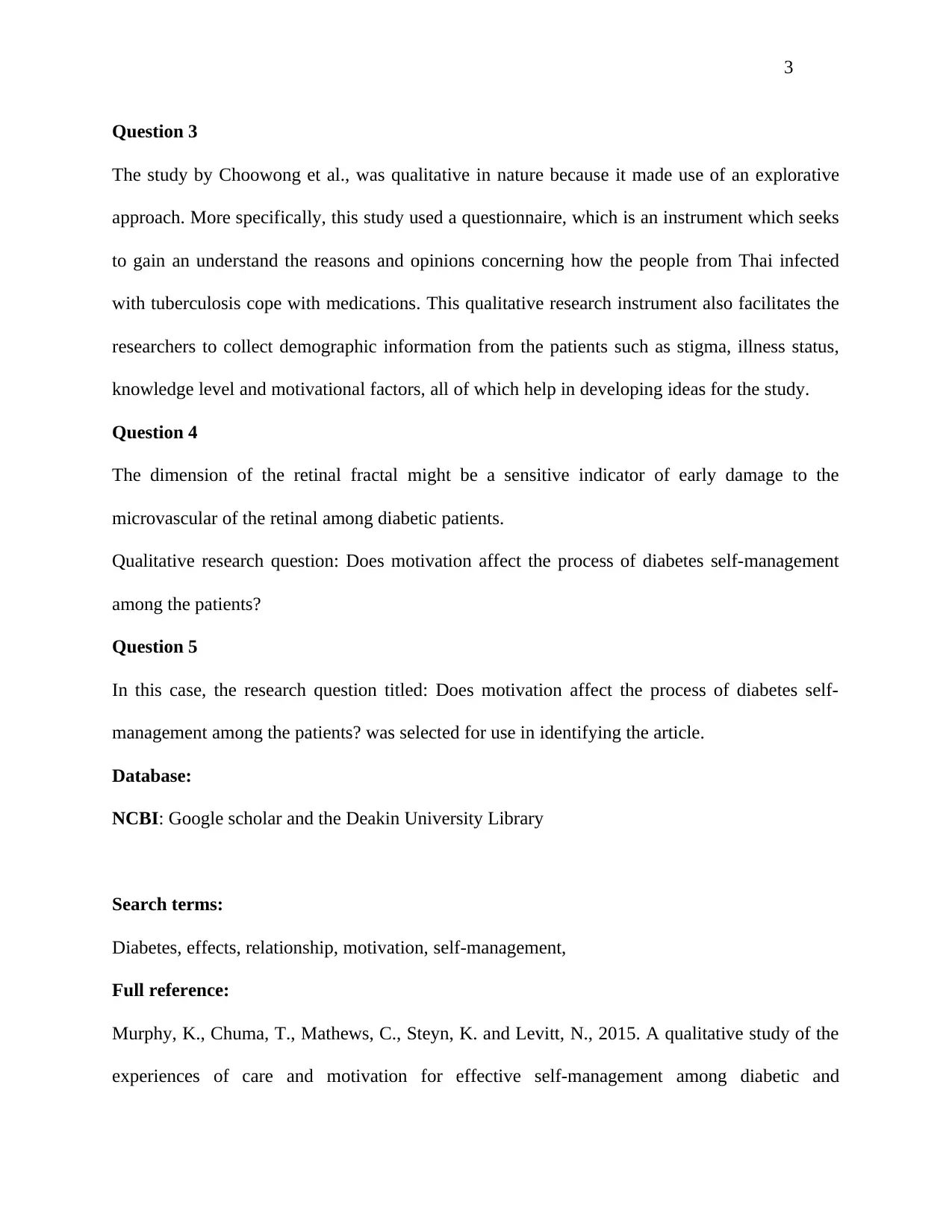
3
Question 3
The study by Choowong et al., was qualitative in nature because it made use of an explorative
approach. More specifically, this study used a questionnaire, which is an instrument which seeks
to gain an understand the reasons and opinions concerning how the people from Thai infected
with tuberculosis cope with medications. This qualitative research instrument also facilitates the
researchers to collect demographic information from the patients such as stigma, illness status,
knowledge level and motivational factors, all of which help in developing ideas for the study.
Question 4
The dimension of the retinal fractal might be a sensitive indicator of early damage to the
microvascular of the retinal among diabetic patients.
Qualitative research question: Does motivation affect the process of diabetes self-management
among the patients?
Question 5
In this case, the research question titled: Does motivation affect the process of diabetes self-
management among the patients? was selected for use in identifying the article.
Database:
NCBI: Google scholar and the Deakin University Library
Search terms:
Diabetes, effects, relationship, motivation, self-management,
Full reference:
Murphy, K., Chuma, T., Mathews, C., Steyn, K. and Levitt, N., 2015. A qualitative study of the
experiences of care and motivation for effective self-management among diabetic and
Question 3
The study by Choowong et al., was qualitative in nature because it made use of an explorative
approach. More specifically, this study used a questionnaire, which is an instrument which seeks
to gain an understand the reasons and opinions concerning how the people from Thai infected
with tuberculosis cope with medications. This qualitative research instrument also facilitates the
researchers to collect demographic information from the patients such as stigma, illness status,
knowledge level and motivational factors, all of which help in developing ideas for the study.
Question 4
The dimension of the retinal fractal might be a sensitive indicator of early damage to the
microvascular of the retinal among diabetic patients.
Qualitative research question: Does motivation affect the process of diabetes self-management
among the patients?
Question 5
In this case, the research question titled: Does motivation affect the process of diabetes self-
management among the patients? was selected for use in identifying the article.
Database:
NCBI: Google scholar and the Deakin University Library
Search terms:
Diabetes, effects, relationship, motivation, self-management,
Full reference:
Murphy, K., Chuma, T., Mathews, C., Steyn, K. and Levitt, N., 2015. A qualitative study of the
experiences of care and motivation for effective self-management among diabetic and
⊘ This is a preview!⊘
Do you want full access?
Subscribe today to unlock all pages.

Trusted by 1+ million students worldwide
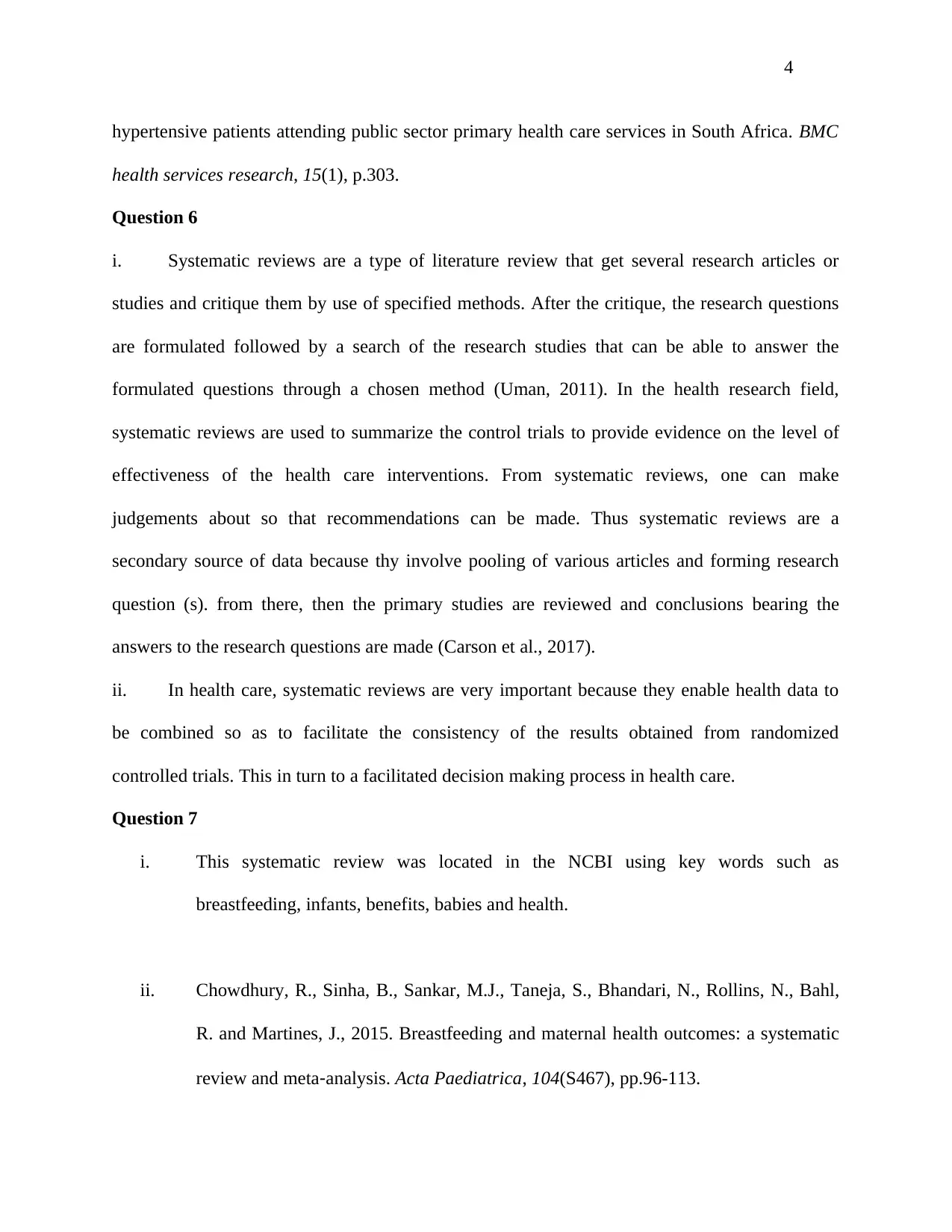
4
hypertensive patients attending public sector primary health care services in South Africa. BMC
health services research, 15(1), p.303.
Question 6
i. Systematic reviews are a type of literature review that get several research articles or
studies and critique them by use of specified methods. After the critique, the research questions
are formulated followed by a search of the research studies that can be able to answer the
formulated questions through a chosen method (Uman, 2011). In the health research field,
systematic reviews are used to summarize the control trials to provide evidence on the level of
effectiveness of the health care interventions. From systematic reviews, one can make
judgements about so that recommendations can be made. Thus systematic reviews are a
secondary source of data because thy involve pooling of various articles and forming research
question (s). from there, then the primary studies are reviewed and conclusions bearing the
answers to the research questions are made (Carson et al., 2017).
ii. In health care, systematic reviews are very important because they enable health data to
be combined so as to facilitate the consistency of the results obtained from randomized
controlled trials. This in turn to a facilitated decision making process in health care.
Question 7
i. This systematic review was located in the NCBI using key words such as
breastfeeding, infants, benefits, babies and health.
ii. Chowdhury, R., Sinha, B., Sankar, M.J., Taneja, S., Bhandari, N., Rollins, N., Bahl,
R. and Martines, J., 2015. Breastfeeding and maternal health outcomes: a systematic
review and meta‐analysis. Acta Paediatrica, 104(S467), pp.96-113.
hypertensive patients attending public sector primary health care services in South Africa. BMC
health services research, 15(1), p.303.
Question 6
i. Systematic reviews are a type of literature review that get several research articles or
studies and critique them by use of specified methods. After the critique, the research questions
are formulated followed by a search of the research studies that can be able to answer the
formulated questions through a chosen method (Uman, 2011). In the health research field,
systematic reviews are used to summarize the control trials to provide evidence on the level of
effectiveness of the health care interventions. From systematic reviews, one can make
judgements about so that recommendations can be made. Thus systematic reviews are a
secondary source of data because thy involve pooling of various articles and forming research
question (s). from there, then the primary studies are reviewed and conclusions bearing the
answers to the research questions are made (Carson et al., 2017).
ii. In health care, systematic reviews are very important because they enable health data to
be combined so as to facilitate the consistency of the results obtained from randomized
controlled trials. This in turn to a facilitated decision making process in health care.
Question 7
i. This systematic review was located in the NCBI using key words such as
breastfeeding, infants, benefits, babies and health.
ii. Chowdhury, R., Sinha, B., Sankar, M.J., Taneja, S., Bhandari, N., Rollins, N., Bahl,
R. and Martines, J., 2015. Breastfeeding and maternal health outcomes: a systematic
review and meta‐analysis. Acta Paediatrica, 104(S467), pp.96-113.
Paraphrase This Document
Need a fresh take? Get an instant paraphrase of this document with our AI Paraphraser
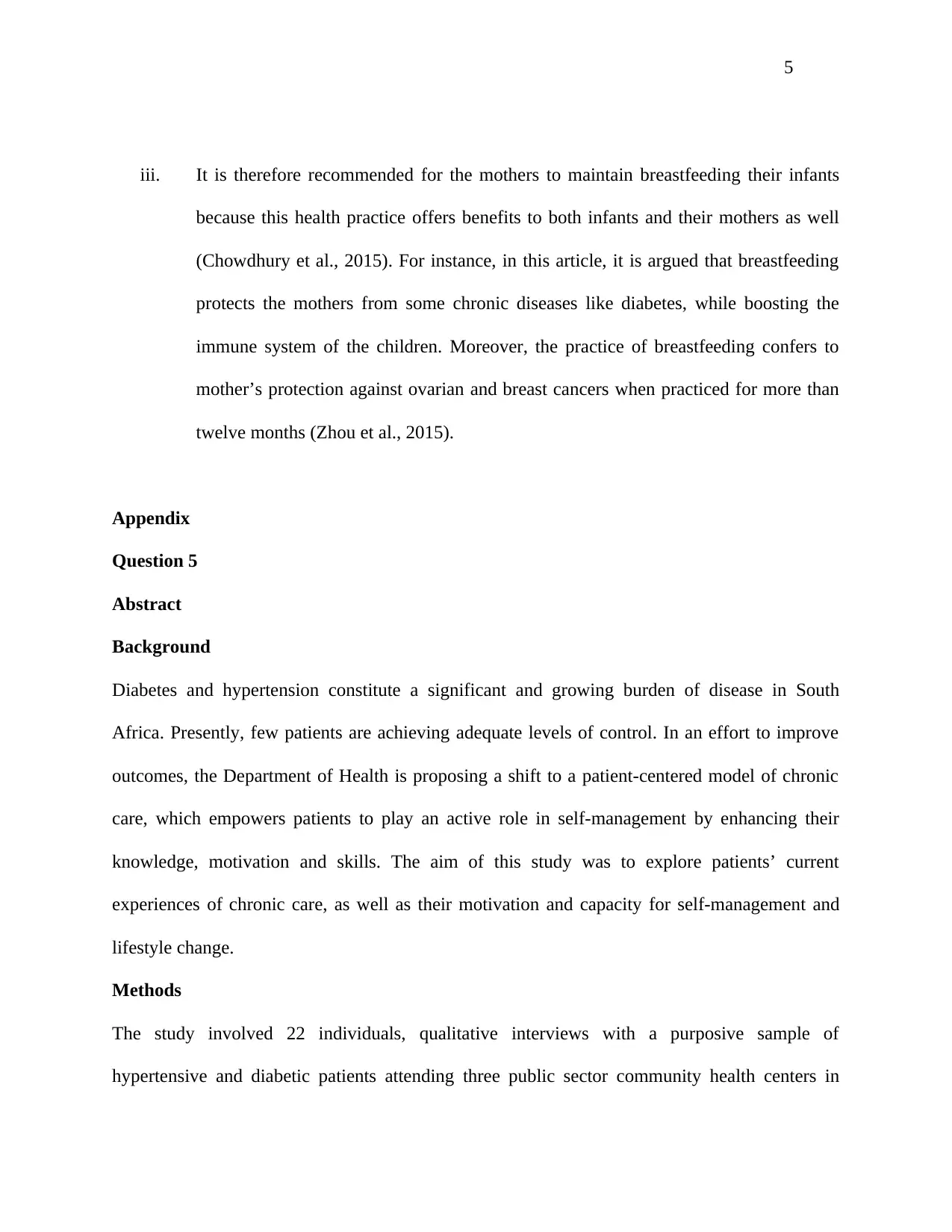
5
iii. It is therefore recommended for the mothers to maintain breastfeeding their infants
because this health practice offers benefits to both infants and their mothers as well
(Chowdhury et al., 2015). For instance, in this article, it is argued that breastfeeding
protects the mothers from some chronic diseases like diabetes, while boosting the
immune system of the children. Moreover, the practice of breastfeeding confers to
mother’s protection against ovarian and breast cancers when practiced for more than
twelve months (Zhou et al., 2015).
Appendix
Question 5
Abstract
Background
Diabetes and hypertension constitute a significant and growing burden of disease in South
Africa. Presently, few patients are achieving adequate levels of control. In an effort to improve
outcomes, the Department of Health is proposing a shift to a patient-centered model of chronic
care, which empowers patients to play an active role in self-management by enhancing their
knowledge, motivation and skills. The aim of this study was to explore patients’ current
experiences of chronic care, as well as their motivation and capacity for self-management and
lifestyle change.
Methods
The study involved 22 individuals, qualitative interviews with a purposive sample of
hypertensive and diabetic patients attending three public sector community health centers in
iii. It is therefore recommended for the mothers to maintain breastfeeding their infants
because this health practice offers benefits to both infants and their mothers as well
(Chowdhury et al., 2015). For instance, in this article, it is argued that breastfeeding
protects the mothers from some chronic diseases like diabetes, while boosting the
immune system of the children. Moreover, the practice of breastfeeding confers to
mother’s protection against ovarian and breast cancers when practiced for more than
twelve months (Zhou et al., 2015).
Appendix
Question 5
Abstract
Background
Diabetes and hypertension constitute a significant and growing burden of disease in South
Africa. Presently, few patients are achieving adequate levels of control. In an effort to improve
outcomes, the Department of Health is proposing a shift to a patient-centered model of chronic
care, which empowers patients to play an active role in self-management by enhancing their
knowledge, motivation and skills. The aim of this study was to explore patients’ current
experiences of chronic care, as well as their motivation and capacity for self-management and
lifestyle change.
Methods
The study involved 22 individuals, qualitative interviews with a purposive sample of
hypertensive and diabetic patients attending three public sector community health centers in
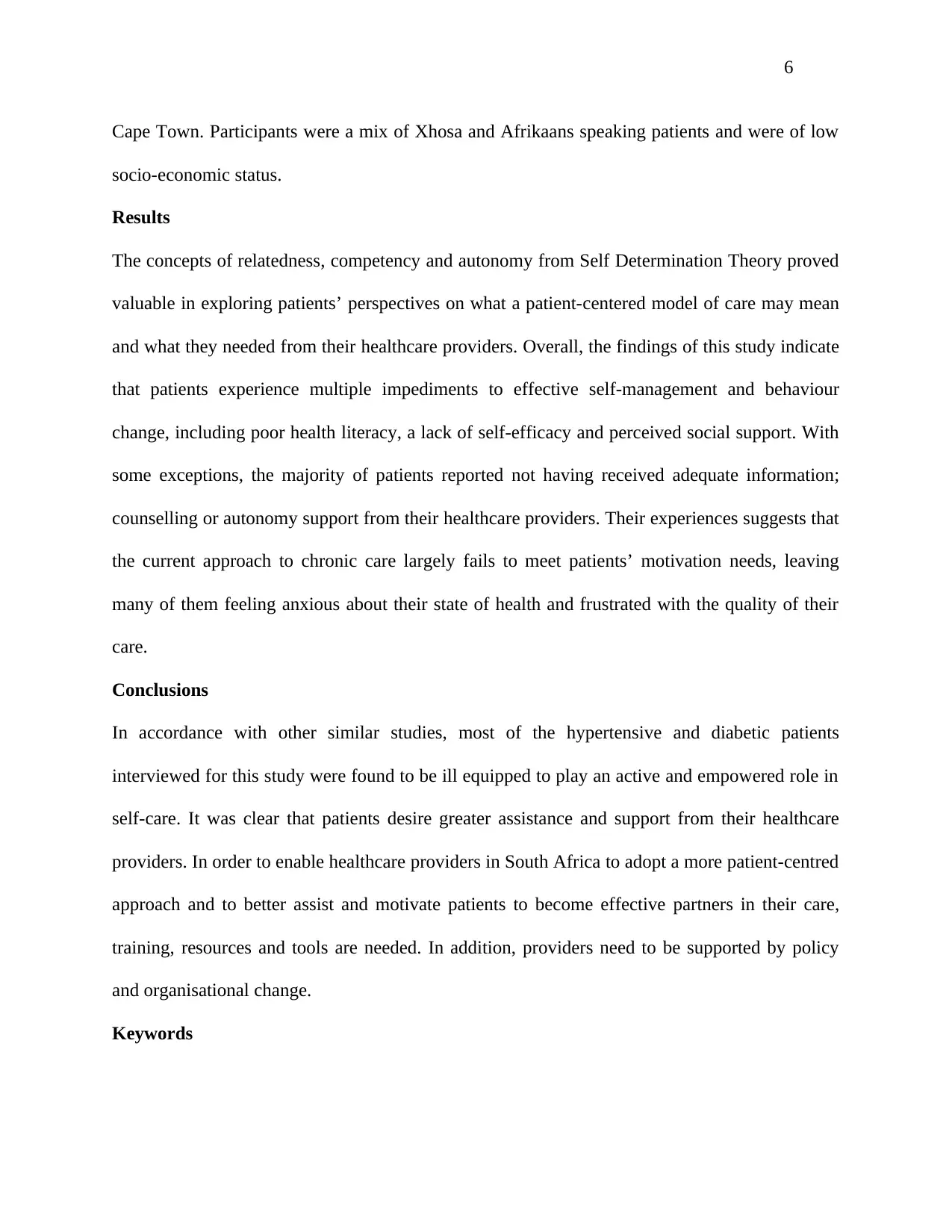
6
Cape Town. Participants were a mix of Xhosa and Afrikaans speaking patients and were of low
socio-economic status.
Results
The concepts of relatedness, competency and autonomy from Self Determination Theory proved
valuable in exploring patients’ perspectives on what a patient-centered model of care may mean
and what they needed from their healthcare providers. Overall, the findings of this study indicate
that patients experience multiple impediments to effective self-management and behaviour
change, including poor health literacy, a lack of self-efficacy and perceived social support. With
some exceptions, the majority of patients reported not having received adequate information;
counselling or autonomy support from their healthcare providers. Their experiences suggests that
the current approach to chronic care largely fails to meet patients’ motivation needs, leaving
many of them feeling anxious about their state of health and frustrated with the quality of their
care.
Conclusions
In accordance with other similar studies, most of the hypertensive and diabetic patients
interviewed for this study were found to be ill equipped to play an active and empowered role in
self-care. It was clear that patients desire greater assistance and support from their healthcare
providers. In order to enable healthcare providers in South Africa to adopt a more patient-centred
approach and to better assist and motivate patients to become effective partners in their care,
training, resources and tools are needed. In addition, providers need to be supported by policy
and organisational change.
Keywords
Cape Town. Participants were a mix of Xhosa and Afrikaans speaking patients and were of low
socio-economic status.
Results
The concepts of relatedness, competency and autonomy from Self Determination Theory proved
valuable in exploring patients’ perspectives on what a patient-centered model of care may mean
and what they needed from their healthcare providers. Overall, the findings of this study indicate
that patients experience multiple impediments to effective self-management and behaviour
change, including poor health literacy, a lack of self-efficacy and perceived social support. With
some exceptions, the majority of patients reported not having received adequate information;
counselling or autonomy support from their healthcare providers. Their experiences suggests that
the current approach to chronic care largely fails to meet patients’ motivation needs, leaving
many of them feeling anxious about their state of health and frustrated with the quality of their
care.
Conclusions
In accordance with other similar studies, most of the hypertensive and diabetic patients
interviewed for this study were found to be ill equipped to play an active and empowered role in
self-care. It was clear that patients desire greater assistance and support from their healthcare
providers. In order to enable healthcare providers in South Africa to adopt a more patient-centred
approach and to better assist and motivate patients to become effective partners in their care,
training, resources and tools are needed. In addition, providers need to be supported by policy
and organisational change.
Keywords
⊘ This is a preview!⊘
Do you want full access?
Subscribe today to unlock all pages.

Trusted by 1+ million students worldwide
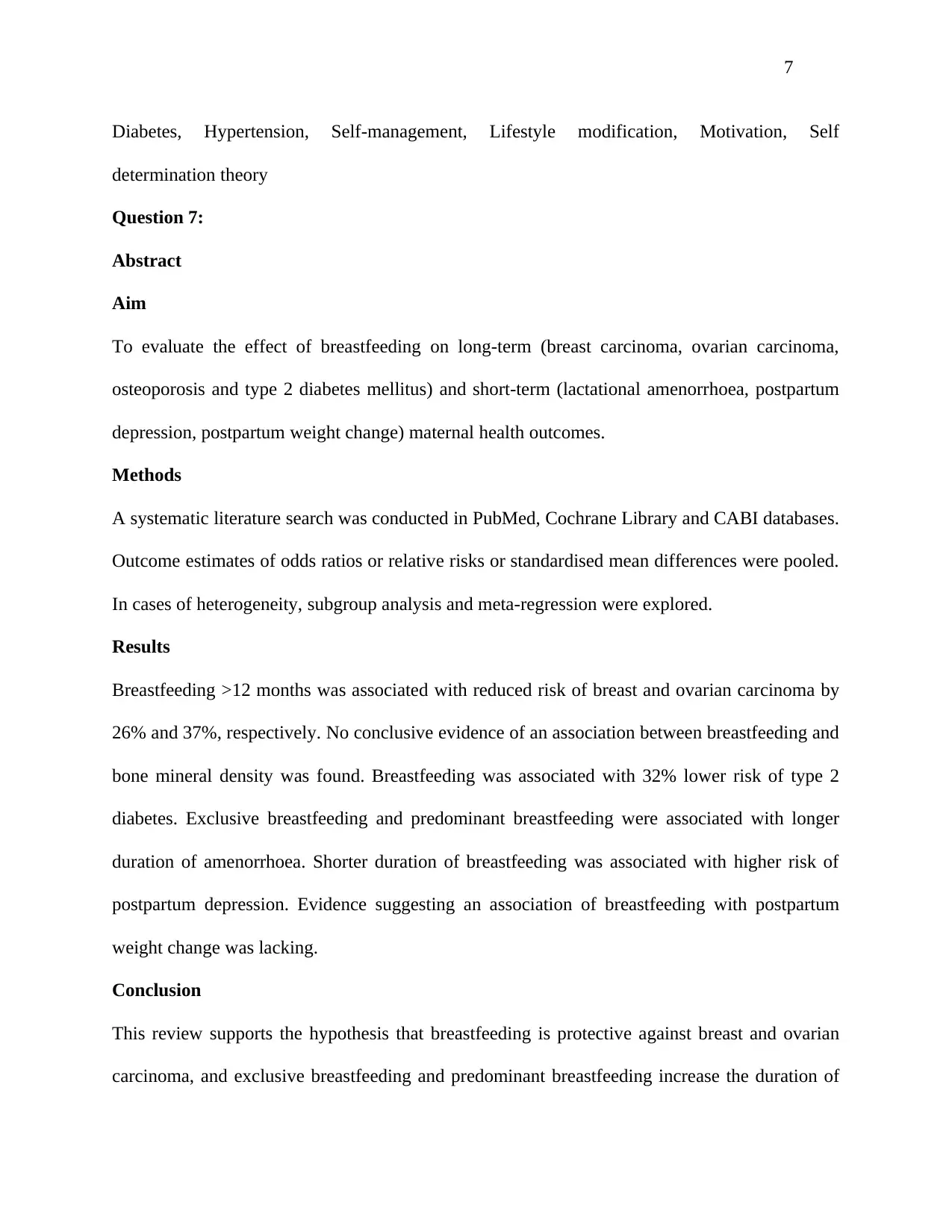
7
Diabetes, Hypertension, Self-management, Lifestyle modification, Motivation, Self
determination theory
Question 7:
Abstract
Aim
To evaluate the effect of breastfeeding on long-term (breast carcinoma, ovarian carcinoma,
osteoporosis and type 2 diabetes mellitus) and short-term (lactational amenorrhoea, postpartum
depression, postpartum weight change) maternal health outcomes.
Methods
A systematic literature search was conducted in PubMed, Cochrane Library and CABI databases.
Outcome estimates of odds ratios or relative risks or standardised mean differences were pooled.
In cases of heterogeneity, subgroup analysis and meta-regression were explored.
Results
Breastfeeding >12 months was associated with reduced risk of breast and ovarian carcinoma by
26% and 37%, respectively. No conclusive evidence of an association between breastfeeding and
bone mineral density was found. Breastfeeding was associated with 32% lower risk of type 2
diabetes. Exclusive breastfeeding and predominant breastfeeding were associated with longer
duration of amenorrhoea. Shorter duration of breastfeeding was associated with higher risk of
postpartum depression. Evidence suggesting an association of breastfeeding with postpartum
weight change was lacking.
Conclusion
This review supports the hypothesis that breastfeeding is protective against breast and ovarian
carcinoma, and exclusive breastfeeding and predominant breastfeeding increase the duration of
Diabetes, Hypertension, Self-management, Lifestyle modification, Motivation, Self
determination theory
Question 7:
Abstract
Aim
To evaluate the effect of breastfeeding on long-term (breast carcinoma, ovarian carcinoma,
osteoporosis and type 2 diabetes mellitus) and short-term (lactational amenorrhoea, postpartum
depression, postpartum weight change) maternal health outcomes.
Methods
A systematic literature search was conducted in PubMed, Cochrane Library and CABI databases.
Outcome estimates of odds ratios or relative risks or standardised mean differences were pooled.
In cases of heterogeneity, subgroup analysis and meta-regression were explored.
Results
Breastfeeding >12 months was associated with reduced risk of breast and ovarian carcinoma by
26% and 37%, respectively. No conclusive evidence of an association between breastfeeding and
bone mineral density was found. Breastfeeding was associated with 32% lower risk of type 2
diabetes. Exclusive breastfeeding and predominant breastfeeding were associated with longer
duration of amenorrhoea. Shorter duration of breastfeeding was associated with higher risk of
postpartum depression. Evidence suggesting an association of breastfeeding with postpartum
weight change was lacking.
Conclusion
This review supports the hypothesis that breastfeeding is protective against breast and ovarian
carcinoma, and exclusive breastfeeding and predominant breastfeeding increase the duration of
Paraphrase This Document
Need a fresh take? Get an instant paraphrase of this document with our AI Paraphraser

8
lactational amenorrhoea. There is evidence that breastfeeding reduces the risk of type 2 diabetes.
However, an association between breastfeeding and bone mineral density or maternal depression
or postpartum weight change was not evident.
Keywords: Breastfeeding, Long and Short Term, Maternal health, Meta-analysis
lactational amenorrhoea. There is evidence that breastfeeding reduces the risk of type 2 diabetes.
However, an association between breastfeeding and bone mineral density or maternal depression
or postpartum weight change was not evident.
Keywords: Breastfeeding, Long and Short Term, Maternal health, Meta-analysis
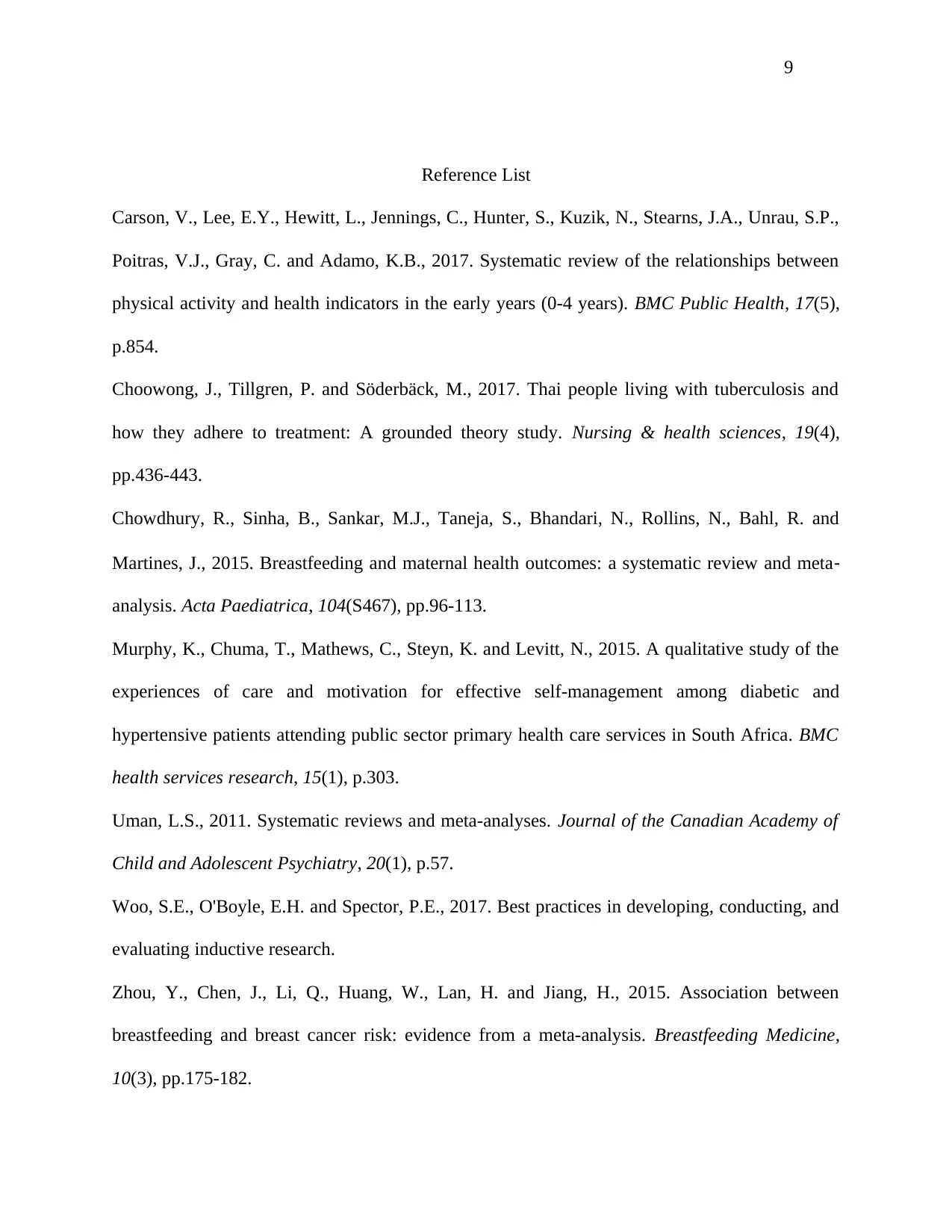
9
Reference List
Carson, V., Lee, E.Y., Hewitt, L., Jennings, C., Hunter, S., Kuzik, N., Stearns, J.A., Unrau, S.P.,
Poitras, V.J., Gray, C. and Adamo, K.B., 2017. Systematic review of the relationships between
physical activity and health indicators in the early years (0-4 years). BMC Public Health, 17(5),
p.854.
Choowong, J., Tillgren, P. and Söderbäck, M., 2017. Thai people living with tuberculosis and
how they adhere to treatment: A grounded theory study. Nursing & health sciences, 19(4),
pp.436-443.
Chowdhury, R., Sinha, B., Sankar, M.J., Taneja, S., Bhandari, N., Rollins, N., Bahl, R. and
Martines, J., 2015. Breastfeeding and maternal health outcomes: a systematic review and meta‐
analysis. Acta Paediatrica, 104(S467), pp.96-113.
Murphy, K., Chuma, T., Mathews, C., Steyn, K. and Levitt, N., 2015. A qualitative study of the
experiences of care and motivation for effective self-management among diabetic and
hypertensive patients attending public sector primary health care services in South Africa. BMC
health services research, 15(1), p.303.
Uman, L.S., 2011. Systematic reviews and meta-analyses. Journal of the Canadian Academy of
Child and Adolescent Psychiatry, 20(1), p.57.
Woo, S.E., O'Boyle, E.H. and Spector, P.E., 2017. Best practices in developing, conducting, and
evaluating inductive research.
Zhou, Y., Chen, J., Li, Q., Huang, W., Lan, H. and Jiang, H., 2015. Association between
breastfeeding and breast cancer risk: evidence from a meta-analysis. Breastfeeding Medicine,
10(3), pp.175-182.
Reference List
Carson, V., Lee, E.Y., Hewitt, L., Jennings, C., Hunter, S., Kuzik, N., Stearns, J.A., Unrau, S.P.,
Poitras, V.J., Gray, C. and Adamo, K.B., 2017. Systematic review of the relationships between
physical activity and health indicators in the early years (0-4 years). BMC Public Health, 17(5),
p.854.
Choowong, J., Tillgren, P. and Söderbäck, M., 2017. Thai people living with tuberculosis and
how they adhere to treatment: A grounded theory study. Nursing & health sciences, 19(4),
pp.436-443.
Chowdhury, R., Sinha, B., Sankar, M.J., Taneja, S., Bhandari, N., Rollins, N., Bahl, R. and
Martines, J., 2015. Breastfeeding and maternal health outcomes: a systematic review and meta‐
analysis. Acta Paediatrica, 104(S467), pp.96-113.
Murphy, K., Chuma, T., Mathews, C., Steyn, K. and Levitt, N., 2015. A qualitative study of the
experiences of care and motivation for effective self-management among diabetic and
hypertensive patients attending public sector primary health care services in South Africa. BMC
health services research, 15(1), p.303.
Uman, L.S., 2011. Systematic reviews and meta-analyses. Journal of the Canadian Academy of
Child and Adolescent Psychiatry, 20(1), p.57.
Woo, S.E., O'Boyle, E.H. and Spector, P.E., 2017. Best practices in developing, conducting, and
evaluating inductive research.
Zhou, Y., Chen, J., Li, Q., Huang, W., Lan, H. and Jiang, H., 2015. Association between
breastfeeding and breast cancer risk: evidence from a meta-analysis. Breastfeeding Medicine,
10(3), pp.175-182.
⊘ This is a preview!⊘
Do you want full access?
Subscribe today to unlock all pages.

Trusted by 1+ million students worldwide
1 out of 9
Related Documents
Your All-in-One AI-Powered Toolkit for Academic Success.
+13062052269
info@desklib.com
Available 24*7 on WhatsApp / Email
![[object Object]](/_next/static/media/star-bottom.7253800d.svg)
Unlock your academic potential
Copyright © 2020–2025 A2Z Services. All Rights Reserved. Developed and managed by ZUCOL.




